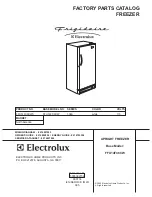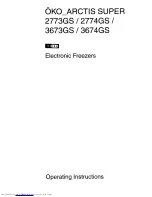
• Be careful not to leave the lid open. Always make sure that the lid is closed properly.
• Try not to open the lid more than is necessary especially in hot, humid weather.
• Arrange frozen food systematically so you can quickly find what you need.
• The location of your freezer is very important. Don't situate it in a warm, unventilated room, next to
your range or heating vent or where it is in direct contact with the sun.
• If you turn the temperature control to the coldest setting for quick freezing, don't forget to turn it
back to the normal setting.
• Defrost the freezer whenever the frost become 1/4" thick.
• A full freezer stays cold longer than a partly filled one. A freezer full of meat stays cold longer than
a freezer full of baked goods.
• Let hot foods cool to room temperature before placing in the freezer. Overloading the freezer
forces the compressor to run longer. Foods that freeze too slowly may lose quality or spoil.
• Be sure to wrap foods properly and wipe containers dry before placing them in the freezer. This
cuts down on frost build-up inside the freezer.
• Freezer shelves and baskets should not be lined with aluminum foil, wax paper, or paper toweling.
Liners interfere with cold air circulation, making the freezer less efficient.
- 8 -
EXTERNAL FREEZER SURFACE TOO WARM
•
The exterior freezer walls can be as much as 30°F
(16.6°C) warmer than room temperature. This
is normal.
TOO NOISY
• Floor weakness, freezer may vibrate if compressor is on
• Cabinet is not positioned solidly. Shim to even freezer.
• When the surrounding noise level is low, you may hear the compressor running. This is normal
as freezers require high efficiency compressors.
LOUDER SOUND LEVELS WHEN COMPRESSOR COMES ON
•
During the start of the 'ON' cycle, the freezer operates at higher pressures. This is normal.
Sound will level off or disappear as the freezer continues to run.
POPPING OR CRACKING SOUND WHEN THE FREEZER COMES ON
•
This is normal. The metal parts within the freezer expand and contract. The sound should level
off or disappear as the freezer continues to run.
BUBBLING OR GURGLING SOUND
•
When refrigerant is circulating throughout the system this type of sound may be heard. This is
normal.
VIBRATING OR RATTLING NOISE
•
Freezer is not level.
•
Floor is uneven or weak.
Vacation and Moving Tips
Short Vacations (less than 3 weeks):
Leave the freezer operating.
Long Vacations:
If the freezer will not be used for several months, remove all food and unplug the
power cord. Clean and dry the interior thoroughly. To prevent odor and mold growth, leave the
freezer door open slightly, blocking it open if necessary.
Moving:
Disconnect the power cord plug from the wall outlet. Remove food, defrost and clean
freezer. Secure all loose items such as base panel, baskets and shelves by taping them securely in
place to prevent damage. In the moving vehicle, secure the freezer to prevent movement and
protect the outside of the freezer with a blanket or similar item.
Energy Saving Tips










































